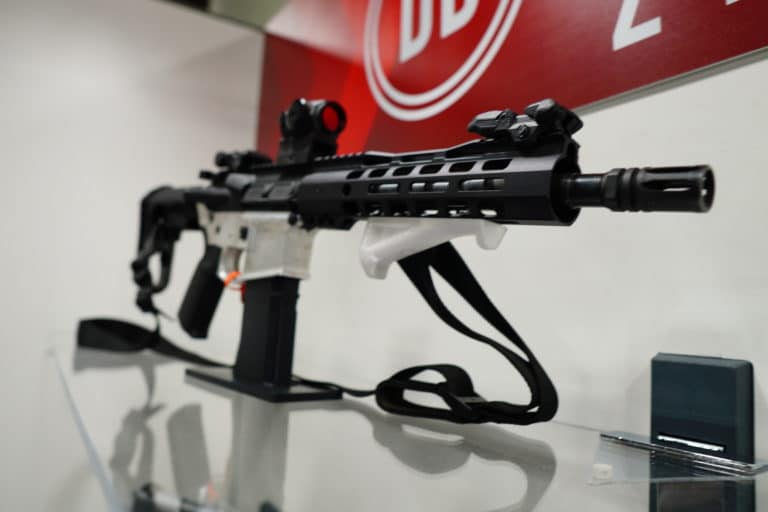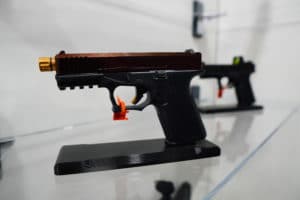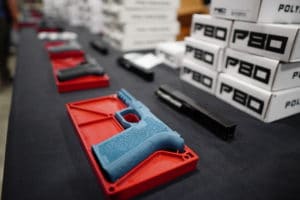The ATF can no longer enforce its unfinished-gun-parts ban against one of the foremost makers of homemade firearm kits.
Judge Reed O’Connor of the U.S. District Court for the Northern District of Texas, a George W. Bush appointee, issued a preliminary injunction on Thursday extending protections against the government’s new regulations on homemade gun parts to Defense Distributed. The ATF can no longer implement its rule in regard to the company or its customers. The judge found those rules, proposed at the request of President Joe Biden (D.), are likely unconstitutional and cause an undue burden on the parts maker.
Judge O’Connor wrote in VanDerStok v. Garland that “[t]he Government’s likely ultra vires enforcement efforts upset decades of ATF regulatory precedent against a public that has relied on that historic posture” and “the liberty interests of law-abiding citizens wishing to engage in historically lawful conduct (dealing in now-regulated parts)—which Defense Distributed shares—outweighs the Government’s competing interest in preventing prohibited persons from unlawfully possessing firearms.”
The decision adds the company, which has been at the forefront of 3D-printed, home-machined gun designs, and litigation over both for years, to a small list of other manufacturers that O’Connor has exempted from the rule. While a different federal judge previously denied an attempt by gun-rights advocates and Republican Attorneys General to have the rule blocked on Second Amendment grounds, Judge O’Connor has found Defense Distributed and the Second Amendment Foundation’s argument the ATF overstepped its authority under the Administrative Procedure Act (APA).
The ruling is another blow to President Biden’s efforts to unilaterally tighten gun regulations through ATF rulemaking rather than legislation. It comes just a few weeks after the Fifth Circuit Court of Appeals ruled the agency’s bump-stock ban violated the APA. Both decisions foreshadow potential legal troubles for Biden’s other major gun rule: the pistol-brace ban.
Judge O’Connor’s ruling adds to the split among judges over whether the government can ban or severely restrict home making of firearms either by banning the practice outright or trying to prevent unfinished parts from being sold. A federal judge in California upheld the state’s “ghost gun” ban in October. But that came after another federal judge ruled Delaware’s ban violates the Second Amendment in September.
In VanDerStok, Judge O’Connor found that the ATF didn’t have the authority to ban the products Defense Distributed sells and the agency’s rule needed to be blocked immediately to prevent the company from going out of business.
“Defense Distributed has shown that it is likely to suffer irreparable harm—through unrecoverable lost revenues and, potentially, eventual total dissolution of its business—if the Court does not provide injunctive relief while litigation is ongoing,” he wrote. “Solely in response to the Final Rule, Defense Distributed avers it ceased dealing in unfinished frames, unfinished receivers, and frame and receiver parts kits out of fear of violating the new regulation. That this fear was well-founded was later confirmed by ATF’s Open Letter identifying certain types of partially manufactured, frames, receivers, and parts kits as ‘firearms’ for purposes of the [Gun Control Act].”
Judge O’Connor ruled against SAF’s claim in the case. He found the gun-rights group itself was not irreparably harmed by the ATF’s rule because its members were still able to buy unfinished gun parts from the two other companies, Tactical Machining, LLC and BlackHawk Manufacturing Group Inc., that he previously granted injunctions for. Still, SAF founder Alan Gottlieb described the preliminary injunction as a “huge victory”
“Judge O’Connor agrees that ATF’s final rule expanded the agency’s authority over parts that may be ‘readily converted’ into frames or receivers, which surpasses the authority granted by Congress,” Adam Kraut, SAF’s executive director, said in a statement. “Even more compelling is that the judge agrees that ATF’s rule unlawfully treats parts kits as firearms. It is refreshing to see rogue administrative agencies being reined in by the checks and balances of our system of government.”
In a blog post on their site, Defense Distributed said their win was a defeat not just for the Biden Administration but also their allies in the gun-control movement.
“This is not just a blow to ATF, who pushed a new definition of ‘firearm’ at their peril,” the company said. “It is also a defeat for Giffords, who were the agents of this illegal attempt to expand the Gun Control Act through the APA process. Their lobbying and regulatory laundry has now spectacularly backfired, and I’m going to personally send them a card and fruit basket.”
Neither the Department of Justice, which oversees the ATF, nor Giffords responded to a request for comment.






